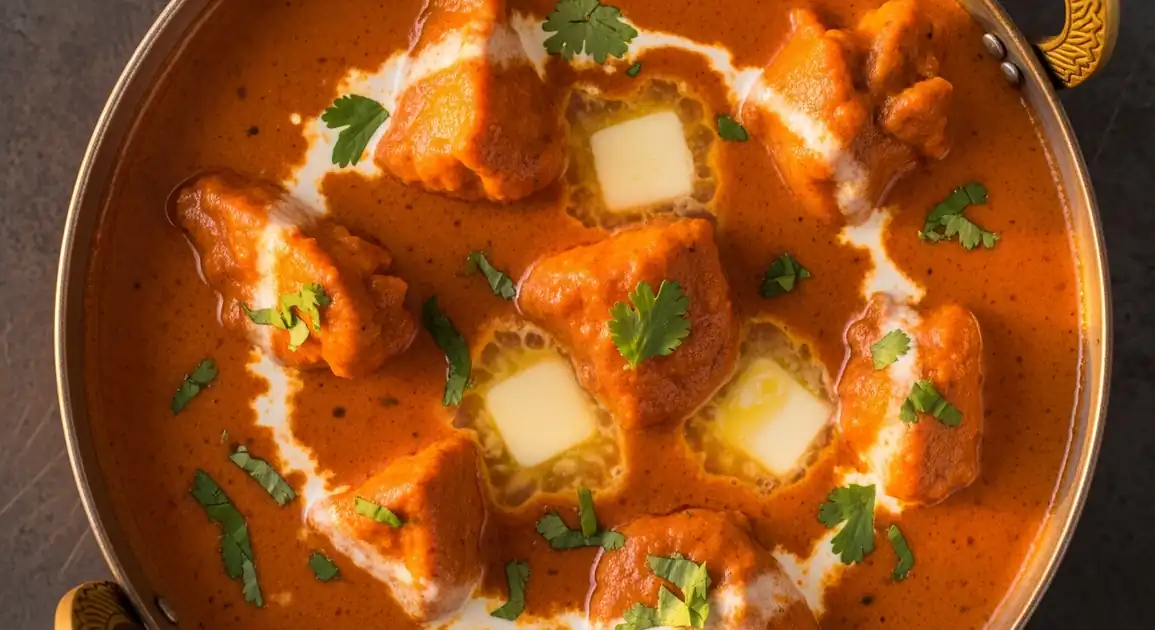Butter Chicken
मुर्ग़ मक्खनी (Murgh Makhani)

Description
Delhi is the birthplace of Butter Chicken, created at the iconic Moti Mahal restaurant in the 1950s. Here, you'll find the most authentic versions, with a perfect balance of tangy tomato, mild spices, and rich creaminess. The city takes immense pride in this dish, with many establishments claiming to serve the "original" or "best" version.
Dietary Information
Serving information
Serving style
Traditionally served in copper or brass handi (round pot) or a clay karahi. Always accompanied by tandoori rotis, naan, or steamed rice. In authentic places, a small sizzle of butter may be added on top just before serving.
Quick facts
Lunch service typically 12 PM - 3:30 PM, dinner service 7 PM - 11 PM. Old Delhi establishments might close earlier.
Safety Tips
What to Look For
-
Freshly prepared gravy with a vibrant orange-red color
Quality butter chicken should have a fresh, vibrant appearance. Dull or brownish color might indicate reheated or old gravy.
-
Properly cooked chicken with no pink centers
The chicken should be fully cooked but still tender. Cut into a piece to check if uncertain.
-
Clean, well-maintained tandoor if visible in open kitchens
A properly maintained tandoor indicates attention to detail and traditional cooking methods.
-
Restaurants with high turnover and local patronage
Popular establishments typically serve fresher food and maintain better quality control.
What to avoid
-
Extremely bright red or unnaturally colored gravy
Excessive food coloring might be masking poor quality ingredients or old sauce.
-
Excessively oily surface with no visible cream incorporation
Some oil separation is normal, but too much indicates poor preparation or old, reheated sauce.
-
Pre-cooked chicken simply dropped in sauce
Authentic butter chicken uses tandoor-cooked chicken that's then finished in the gravy, not boiled chicken pieces.
-
Gravy that's been repeatedly reheated
This dish should ideally be prepared fresh. Watch for gravy with a skin or uneven consistency, signs of repeated reheating.
Price information
Price range
Budget tips
- Old Delhi establishments typically charge 250-400 INR for a generous portion.
- Mid-range restaurants in central Delhi charge around 350-500 INR.
- Upscale restaurants in South Delhi or five-star hotels charge 600-850 INR.
- Lunch thali specials including butter chicken offer better value than à la carte.
- Portions typically serve 2-3 people when paired with naan or rice.
Value indicators
- Visible tandoor char on chicken pieces indicating proper cooking.
- Fresh, vibrant gravy rather than dull or brownish sauce.
- Balanced flavor with no excessive sweetness or spiciness.
- Tender, juicy chicken rather than dry or overcooked meat.
- Restaurants that claim historical connections to the dish's origin.
Where to Find This Dish
Pandara Road
Home to several famous North Indian restaurants known for butter chicken.
Pandara Road Market, India Gate vicinity
Dinner (7 PM - 11 PM), Weekend lunch
Connaught Place
Central Delhi's dining hub featuring some historic establishments serving butter chicken.
Outer Circle, Inner Circle
Lunch (12 PM - 3 PM), Dinner (7 PM - 10 PM)
Old Delhi
Home to some classic eateries serving more rustic versions of butter chicken.
Jama Masjid area, Chandni Chowk
Lunch (1 PM - 4 PM), Early dinner (6 PM - 9 PM)
Daryaganj
Location of the original Moti Mahal restaurant where butter chicken was invented.
Original Moti Mahal location
Lunch (12 PM - 3 PM), Dinner (7 PM - 10:30 PM)
Vendor Tips
- In Delhi, ask if they prepare butter chicken in the traditional method with tandoor-cooked chicken.
- Restaurants with "Punjabi" or "Mughlai" in their name typically excel at butter chicken.
- Historic restaurants operating since the 1950s-1970s often maintain authentic recipes.
- Look for places where butter chicken is prominently featured on their menu or advertising.
How to Order
Regional Variations
-
Old Delhi Style
(पुरानी दिल्ली स्टाइल)
More rustic and robust, often with a slightly higher spice level and less cream than newer versions.
-
Moti Mahal Original
(मोती महल ओरिजिनल)
Claims to be the original recipe, balanced between tangy and creamy with a distinctive smoky flavor from the tandoor.
-
South Delhi Refined Style
(साउथ दिल्ली रिफाइंड स्टाइल)
Upscale restaurants in South Delhi often serve more elegant, refined versions with smoother gravy and precise spicing.
-
New Delhi Fusion
(न्यू दिल्ली फ्यूज़न)
Modern interpretations found in contemporary restaurants, sometimes incorporating international influences or presentation styles.
Cultural context
History
Butter Chicken was reportedly created in the 1950s at Moti Mahal restaurant in Delhi by chef Kundan Lal Gujral. The innovation came from a need to use leftover tandoori chicken, which was mixed with a tomato-butter-cream sauce to prevent it from drying out. This accidental creation became one of India's most famous culinary exports, evolving from a restaurant specialty to a globally recognized symbol of Indian cuisine while maintaining its ties to Delhi's culinary heritage.
Local significance
A source of immense culinary pride for Delhi, considered one of the city's greatest contributions to global cuisine. Represents the post-partition innovation of Punjabi refugee restaurateurs.
Eating customs
- In Delhi, typically eaten with butter naan or roomali roti rather than plain rice.
- The bread is used to scoop up both chicken pieces and the prized gravy.
- Locals often judge a restaurant's quality by its butter chicken.